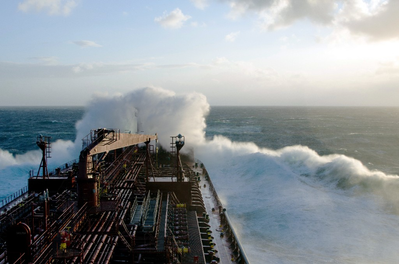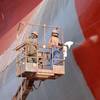Ship Performance Has a 80/20 Rule
The shipping industry risks investing billions of dollars on vessel optimization services that fail to deliver on overall operational efficiency and performance due to a lack of understanding and appreciation of weather which accounts for 80 percent of the impact on vessel performance warns voyage intelligence and insight specialist StratumFive.
As vessel performance optimization becomes increasingly more sophisticated, ship owners and operators have access to a far broader range of technologies, datasets and potential avenues for optimization than ever before. However, complex solutions which attempt to simultaneously optimize every aspect of a voyage are losing sight of the basic fact that fuel consumption is a function of the resistance that the vessel has to overcome - and that resistance is in turn a function of several other factors, such as vessel block coefficient, loading and trim, water density, currents, waves, wind and biofouling.
Of these factors, the currents, waves and wind affect every voyage. The resistance when navigating in unfavorable conditions generally increases by 50-100 percent of the total ship resistance in calm weather. Indeed, MAN Energy Solutions’ analysis of trading conditions for a typical 140,000 dwt bulk carrier shows that on some routes, the increased resistance, or sea margin, can reach extreme values up to 220 percent.
Stuart Nicholls, CEO, StratumFive, said, “The Pareto principle states that, for many events, roughly 80 percent of the effects come from 20 percent of the causes. We believe that the combined effects of weather account for around 80 percent of the effects on vessel performance, whereas other factors make up the remaining 20 percent. While the 20 percent remains important and can create important marginal gains, the impact of weather significantly outweighs them, but is often sidelined or ignored.
This means that businesses miss out on significant efficiency gains – not to mention avoiding adverse weather conditions, which helps to minimise cargo damage, ensure the safety of passengers and crew onboard, and deliver more precise arrival times while also reducing fuel consumption and associated costs and emissions. By factoring in the impact of weather on a voyage, vessel owners and operators can make crucial decisions about their route.
Shipping is, ultimately, a question of time and distance, and we need to stay focused on the factors that have the most impact on these; weather is at the top of the list. No matter how well optimized a vessel’s engine or trim might be, if the vessel is experiencing adverse weather conditions, this ceases to be relevant.”
Huw Davies, Principal of Meteorology, StratumFive, added, “Weather affects the safety and performance of vessels, cargo and seafarers. Forecast accuracy has greatly improved and weather forecasts are now some 20 percent more accurate than they were only five years ago. Accurate, detailed weather forecasts support effective planning and operations and have a profound effect on a voyage’s safety and efficiency. This not only saves time, money and fuel, but also minimizes the environmental impact of our ships, and most importantly keeps the crew safe.”
Founded in 2009, StratumFive is a voyage intelligence company that services more than 11,000 vessels within the global fleet. OTIS (Online Tracking and Information Software), is StratumFive’s voyage tracking and monitoring software, which provides accurate location data, with up to thousands of locations transmitted every day per vessel. This equips owners, operators and shore crew with the most accurate information available on where their ship is located, and what it is doing and minimizes the risk to ships and crew from adverse weather conditions.
To enhance its platform for total voyage intelligence and insight, StratumFive is leveraging the use of existing and new datasets to use machine learning techniques to build predictive models based on analytics and data from past voyages. The more datasets that are added, the more detailed and accurate its predictions will become -ensuring that the platform is flexible, searchable, accessible and easy to use.











